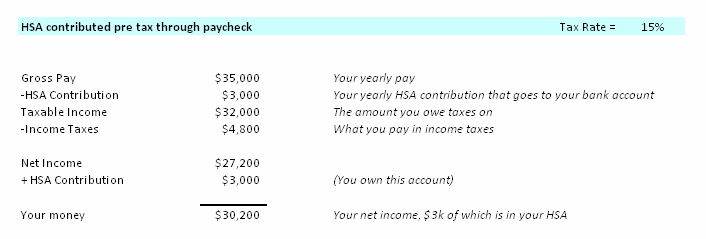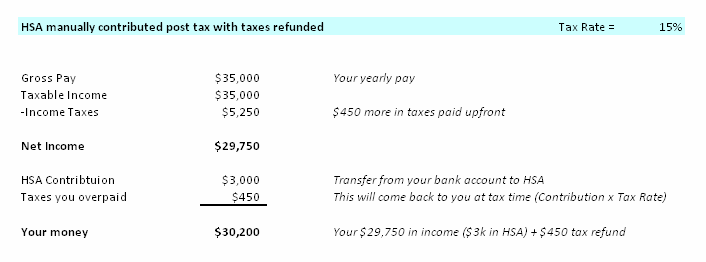A central theme of this site is to define the advantages of HDHP/HSA’s compared to other types of health insurance. This is a major one.
One of the key financial benefits of an HSA is the Triple Tax Advantage, which will be covered here in detail. Remember that an HSA is a tax advantaged savings account for medical expenses, which you can open if you have an HDHP. Basically, your own savings account for medical expenses that you own forever and can even invest and grow. An HSA is tax advantaged in three key areas: Contributions, Earnings, and Withdrawals.
1) HSA contributions are tax free
Similar to a 401(k), money you contribute to your HSA is pre-tax. This means that you do not pay income taxes on the money you contribute to your HSA. For example, if you earn $35k per year, and invest $3k in your HSA, you will only pay tax on $32k of income. You save an amount equal to your contribution multiplied by your tax rate.
Example: $3000 contribution x 15% tax rate = $450 tax savings
Why is this an advantage – you keep more of your money you earn, instead of giving it to Uncle Sam!
How exactly is your taxable income reduced? This depends on how you fund your HSA, and there are two main ways to contribute to your HSA:
A) HSA contributions are deducted from your paycheck before taxes are paid (preferred method). Similar to a 401(k) contribution, your HSA contribution is deducted from your paycheck each pay period, before taxes are paid:
As you can see, your contributions are never taxed.
B) Or, you manually contribute to your HSA using after tax money. In this scenario, you simply transfer money to your HSA each month. This is how I fund my HSA at HSA Bank, and I have an automatic contribution setup for $160 every month on the 26th.
If you manually contribute, you will need to deduct your contributions from your gross income on that year’s tax return. When I file my taxes online, a section prompts me about my HSA contributions for the year. That way, I ensure my contributions are not taxed.
This method takes a little more work (paperwork for taxes + performing monthly contribution), but not much. An automated contribution plan definitely helps. However, this method of contribution loses out on FICA taxes (article to come).
2) Your HSA earnings grow tax free
Capital gains occur when you sell an asset at a higher price than what you paid for it. Basically, you pay tax on your profit. With an HSA, you do not owe taxes on your interest income or capital gains that accrue in your health savings account. Thus, your HSA can be growing and you don’t owe Uncle Sam a dime.
(Oh yeah, did you know you can invest your HSA into stocks, bonds, ETF’s, etc?)
Why this is an advantage – besides avoiding nasty paperwork, consider the wonderful concept of compound interest. Instead of paying your investment gains out in taxes, those gains can further grow, and the gains on those initial gains can grow, wash rinse repeat. The net result is that your portfolio will be worth more over time. By dutifully contributing to your HSA each month, and by making long term investments, you can grow it into one heck of a nest egg for medical expenses or retirement.
Article to come on the magic of compound interest…
3) Qualified withdrawals are tax free from your HSA
You have an HSA to cover future medical expenses. Here’s the kicker: if you use your HSA to purchase qualified medical expenses (and a lot of things qualify), you owe no tax that withdrawal. For example, if you visit your doctor and owe $45 for the visit, you can pay using your HSA debit card, or reimburse yourself for that cost (transfer from HSA -> checking account). There is no paperwork to be filed and no tax to be paid for that withdrawal. Heck yeah, no taxes! So you contributed tax free, it grew tax free, and it can be withdrawn tax free.
Why this is an advantage – you are spending tax free money on medical expenses.
That is how the Triple Tax Advantage adds up: by not paying income taxes on contributions, earnings, or withdrawals, you effectively pay for medical expenses with tax free money. There are very few places I can think of where you outright avoid paying taxes on your income, which is one of the reasons why the Triple Tax Advantage is a strong piece of the HSA advantage.
In summary, the Triple Tax Advantage reduces your income taxes for a year. That means you pay less to Uncle Sam and keep more in your pocket (via your HSA). Additionally, it provides a vehicle for tax-free investment growth. This is a huge advantage when you consider the ill effects of capital gains taxes on a portfolio over many years. You can take advantage of this vehicle to create an account that not only covers all of your medical expenses, but also serves as a backup retirement account, should you be so lucky. Do not underestimate the power of compound interest over many years of contributing.



